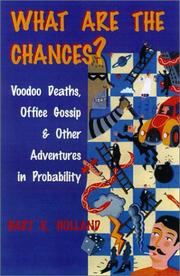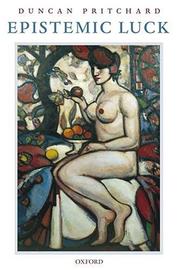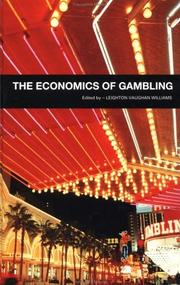| Listing 1 - 10 of 1618 | << page >> |
Sort by
|

ISBN: 0801875927 9780801875922 9780801869419 0801869412 Year: 2002 Publisher: Baltimore Johns Hopkins University Press
Abstract | Keywords | Export | Availability | Bookmark
 Loading...
Loading...Choose an application
- Reference Manager
- EndNote
- RefWorks (Direct export to RefWorks)
Whether you have only a distant recollection of high school algebra or use differential equations every day, this book offers examples of the impact of chance that will amuse and astonish.
Probabilities --- Chance --- Fortune --- Necessity (Philosophy)
Book
ISBN: 1612098746 Year: 2011 Publisher: New York : Nova Science Publishers,
Abstract | Keywords | Export | Availability | Bookmark
 Loading...
Loading...Choose an application
- Reference Manager
- EndNote
- RefWorks (Direct export to RefWorks)

ISBN: 0191602299 0191535664 1281190888 9786611190880 1435621972 9780191535666 9780191602290 9780199280384 019928038X 9780199229789 019928038X Year: 2005 Publisher: Oxford New York Clarendon Press Oxford University Press
Abstract | Keywords | Export | Availability | Bookmark
 Loading...
Loading...Choose an application
- Reference Manager
- EndNote
- RefWorks (Direct export to RefWorks)
Offering a philosophical examination of the concept of luck and its relationship to knowledge, this text demonstrates how a more nuanced understanding of the relationship between knowledge and luck can enable us to see past some of the most intractable disputes in the contemporary theory of knowledge.
Knowledge, Theory of. --- Chance. --- Skepticism.
Book
ISBN: 9798987853177 Year: 2023 Publisher: Boston, Massachusetts : Alinea Learning,
Abstract | Keywords | Export | Availability | Bookmark
 Loading...
Loading...Choose an application
- Reference Manager
- EndNote
- RefWorks (Direct export to RefWorks)

ISBN: 1134508387 1280221364 9786610221363 0203986938 9780203986936 9780415260916 0415260914 6610221367 9781134508389 9781134508334 1134508336 9781134508372 1134508379 9780415753548 0415753546 Year: 2003 Publisher: London New York Routledge
Abstract | Keywords | Export | Availability | Bookmark
 Loading...
Loading...Choose an application
- Reference Manager
- EndNote
- RefWorks (Direct export to RefWorks)
Against a background of extraordinary growth in the popularity of betting and gaming across many countries of the world, there has never been a greater need for a study into gambling's most important factor - its economics.This collection of original contributions drawn from such leading experts as David Peel, Stephen Creigh-Tyte, Raymond Sauer and Donald Siegel covers such interesting themes as:*betting on the horses*over-under betting in football games*national lotteries and lottery fatigue*demand for gambling*economic impact of casino gamblingThis timely and comp
Gambling. --- Gambling --- Betting --- Chance, Games of --- Games of chance --- Gaming (Gambling) --- Games --- Casinos --- Wagers --- Economic aspects.
Book
ISBN: 1910979422 9781910979426 1909976512 9781909976511 1910979414 Year: 2017 Publisher: Hook Waterside Press
Abstract | Keywords | Export | Availability | Bookmark
 Loading...
Loading...Choose an application
- Reference Manager
- EndNote
- RefWorks (Direct export to RefWorks)
Gambling. --- Gamblers --- Gambling --- Betting --- Chance, Games of --- Games of chance --- Gaming (Gambling) --- Games --- Casinos --- Wagers
Book
ISBN: 1282607499 9786612607493 1400834457 9781400834457 0691138907 9780691138909 Year: 2010 Publisher: Princeton, N.J. Princeton University Press
Abstract | Keywords | Export | Availability | Bookmark
 Loading...
Loading...Choose an application
- Reference Manager
- EndNote
- RefWorks (Direct export to RefWorks)
Why do so many gamblers risk it all when they know the odds of winning are against them? Why do they believe dice are ""hot"" in a winning streak? Why do we expect heads on a coin toss after several flips have turned up tails? What's Luck Got to Do with It? takes a lively and eye-opening look at the mathematics, history, and psychology of gambling to reveal the most widely held misconceptions about luck. It exposes the hazards of feeling lucky, and uses the mathematics of predictable outcomes to show when our chances of winning are actually good. Mathematician Joseph Mazur tra
Gambling --- Chance --- Games of chance (Mathematics) --- Gambling problem (Mathematics) --- Game theory --- Betting --- Chance, Games of --- Games of chance --- Gaming (Gambling) --- Games --- Casinos --- Wagers --- Fortune --- Necessity (Philosophy) --- Probabilities --- Social aspects. --- Psychological aspects. --- Social problems --- Operational research. Game theory
Book
ISBN: 1472542304 1282655019 9786612655012 1441109714 9781441109712 9781282655010 9781441125316 1441125310 9781472542304 6612655011 1441110143 Year: 2011 Publisher: London New York Continuum
Abstract | Keywords | Export | Availability | Bookmark
 Loading...
Loading...Choose an application
- Reference Manager
- EndNote
- RefWorks (Direct export to RefWorks)
Chance, and its representation in literature, has a long and problematic history. It is a vital aspect of the way we experience the world, and yet its function is frequently marginalised and downplayed. Offering a new reading of the development of the novel during the mid-twentieth century, Jordan argues that this simple novelistic paradox became more pressing during a period in which chance became a cultural, scientific and literary preoccupation - through scientific developments such as quantum mechanics and the uncertainty principle, the influence of existential philosophy, the growth of gambling, and the uncertainty provoked by the Second World War. In tracing the novel's representation of chance during this crucial period, we see both the development of the novel, and draw wider conclusions about the relationship between narrative and the contingent, the arbitrary and the uncertain. While the novel had historically rejected, marginalised or undermined chance, during this period it becomes a creative and welcome co-contributor to the novel's development, as writers such as Samuel Beckett, B.S. Johnson, Henry Green and Iris Murdoch show.
English fiction --- Chance in literature. --- History and criticism.
Book
ISBN: 3030903141 3030903133 Year: 2021 Publisher: Cham, Switzerland : Springer,
Abstract | Keywords | Export | Availability | Bookmark
 Loading...
Loading...Choose an application
- Reference Manager
- EndNote
- RefWorks (Direct export to RefWorks)
Random variables. --- Chance variables --- Stochastic variables --- Probabilities --- Variables (Mathematics)
Book
ISBN: 1317164083 1315572753 1317164075 1282382861 9786612382864 0754699145 9780754699149 9781282382862 9780754679615 Year: 2009 Publisher: Farnham Burlington, VT Ashgate
Abstract | Keywords | Export | Availability | Bookmark
 Loading...
Loading...Choose an application
- Reference Manager
- EndNote
- RefWorks (Direct export to RefWorks)
The application of probability and statistics to an ever-widening number of life-decisions serves to reproduce, reinforce, and widen disparities in the quality of life that different groups of people can enjoy. As a critical technology assessment, the ways in which bad luck early in life increase the probability that hardship and loss will accumulate across the life course are illustrated. Analysis shows the ways in which individual decisions, informed by statistical models, shape the opportunities people face in both market and non-market environments.
Discrimination. --- Social stratification. --- Statistics --- Chance --- Social aspects. --- Social aspects.
| Listing 1 - 10 of 1618 | << page >> |
Sort by
|

 Search
Search Feedback
Feedback About UniCat
About UniCat  Help
Help News
News